Ah, the hard keeper. In an era where overweight horses seem to be the mainstay of equine health problems—giving diseases such as laminitis and metabolic disease more credence than ever—the chronically underweight horse seems by default almost archaic. And yet we all know the usual suspects: the senior horse, the highly athletic performance horse, or that chronically lanky horse out in the field. Here are some tips to get weight on these hard keepers.
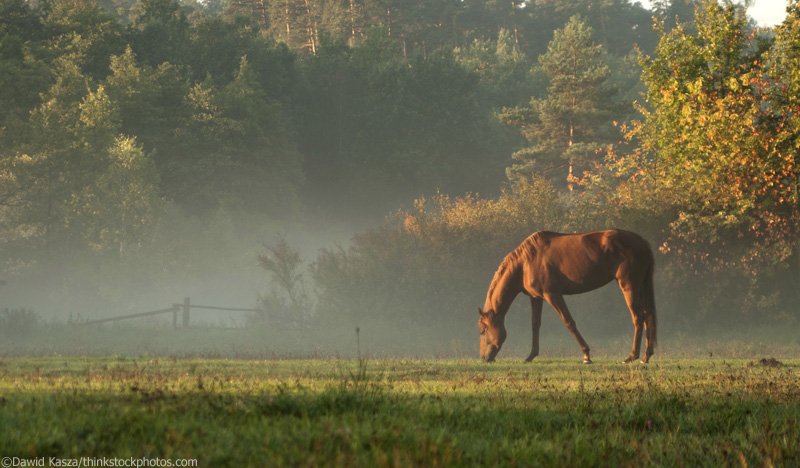
Understanding that some athletically lean horses will be a healthy score of 4, keep your eye on the following areas of your horse’s body: neck, withers, shoulders, ribs, loin, and tail head. Thin horses will have accentuated necks sometimes appearing concave, bony withers, prominent shoulders, ribs ranging from faintly visible to protruding, a “pokey” loin, and a prominent tail head, all to varying degrees.
Secondly, although not all chronically thin horses are created equal, they should at first be approached medically in the same way. If you are having trouble putting or keeping weight on your horse, first have your veterinarian come out for a complete physical exam. This should include blood work to rule out chronic medical issues like liver or kidney problems as well as a fecal test to rule out chronic parasitism. A dental exam and teeth floating should also be performed to rule out or at least manage poor dentition. This is imperative for senior horse care.
Thirdly, consider having your hay or pasture analyzed. This helps as a starting place to fully assess your horse’s diet.
Once those items have been taken care of, it’s time to start assessing your horse’s individual needs according to his lifestyle. Every horse is different in his nutritional requirements, even those of the same breed on the same training program. Let’s take a look at some common hard keeper scenarios.
1. Horses without access to adequate high-quality grazing.
In some boarding situations, there are simply too many horses on too little land. Or, in other situations, maybe the environment just isn’t fertile enough to provide good quality pasture. Either way, lack of high-quality grazing can affect a horse’s body condition score if he is susceptible to weight loss. If you are experiencing this type of situation, evaluate the following items:
- Can you send samples of your pasture for analysis?
- Is low-quality grazing a seasonal problem, or year-round?
- Is low-quality grazing due to high animal density in the field or poor quality soil?
- Can you purchase high-quality hay for supplementation?
Purchasing high-quality hay from an outside source is sometimes the simplest remedy for poor quality grazing at the barn. If this is an option where you live, again consider having the hay quality analyzed. Your local university agricultural extension agent should be able to help you find where to send your samples and help interpret the results.
If high-quality roughage is simply hard to come by in your location—for example, if you live in a very dry area—adding alfalfa cubes and/or beet pulp to your horse’s daily ration is another simple way to add high-quality fiber to the diet.
Read more about selecting hay >>
2. Active athletes.
Hard working performance horses have extremely high caloric demands and are usually given a grain concentrate in addition to roughage to provide adequate energy. Sometimes, however, despite a good, well-balanced feed, an equine athlete still can’t seem to keep on weight. In these cases, give serious consideration to ulcers, a common stomach malady affecting a chronically stressed horse. Ask your vet about endoscopy for diagnostic purposes. If a gastric ulcer is found, there are medications on the market to help the stomach lining heal.
Read more on feeding competitive horses >>
3. Seniors.
Older horses are notorious for losing weight. While some of this has to do with a changing metabolism, a majority of the blame often falls to poor dentition. As mentioned above, regular dental exams and floating are imperative to keep an older horse’s teeth in their best possible condition.
In addition to managing the teeth, you should also make the senior horse’s diet as easy-to-chew as possible. Consider offering your senior a complete feed formulated specifically for older horses. Wetting this feed down with warm water can make it easier to chew. Creating a slurry that the horse can essentially slurp down is a great way to help your older horse easily ingest calories.
Read more on feeding senior horses >>
There are other weight-gain tips that can apply to any horse. If your horse lives in a herd setting, pay attention to herd dynamics in the field. Is your hard keeper able to get access to food and water without having to battle his way through the herd? Also consider the weather. In winter, for example, make sure your horse isn’t expending unnecessary calories just trying to stay warm. In the spring, make sure your horse can easily access feed without having to wade through excessive mud and muck.
The addition of vegetable oil to a horse’s feed once or twice daily is also an easy way to pack on pure calories. Start with a small amount, such as a quarter cup, and then increase from there if needed. Make any increases slowly, as too much oil can result in diarrhea.
Monitoring your horse’s weight on a regular basis is key to making progress. While weight tapes may not be the most accurate reflection of a horse’s true weight, they do provide a consistent number with which to monitor progress. Make sure you know how to use a weight tape and use the same one consistently. Since all diet changes should be made gradually and therefore weight changes will reflect these slow changes, consider weight taping your horse at the first of every month. If you don’t see a change in the numbers over the course of a few months, consult with your veterinarian.


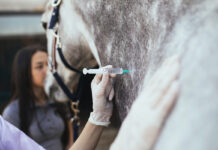
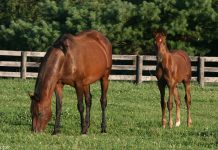

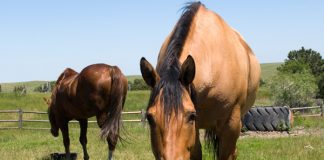
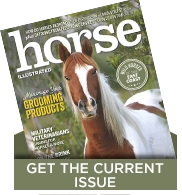
Thank You for this very informational article.
I am so glad my horses are easy keepers. Easy keepers are just that, EASY!